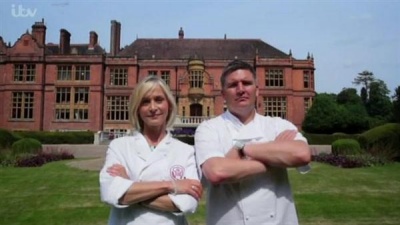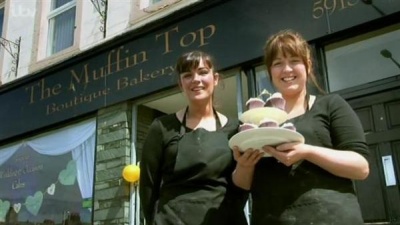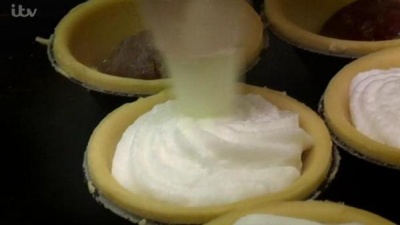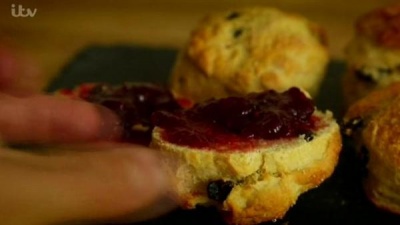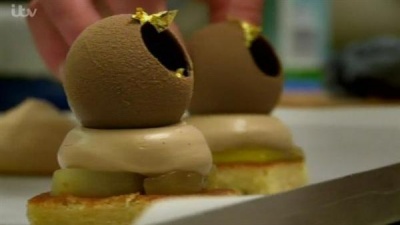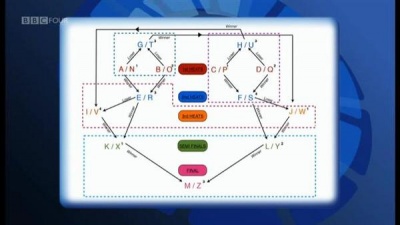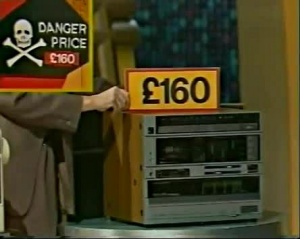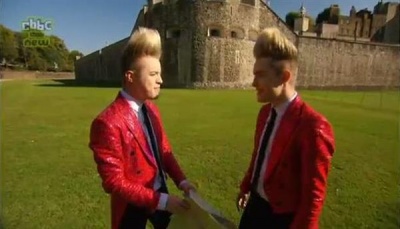Weaver's Week 2014-01-19
Last Week | Weaver's Week Index | Next Week
We may only be nineteen days into 2014, but the prize for Stand Up Comedy of the Year has been won. This week, ITV perfected its deadpan delivery, keeping a straight face while it told MPs how "the BBC has rushed to commission or produce almost identical programmes to those by ITV". We applaud the channel's demonstration of perfect comedy timing.
Contents |
Britain's Best Bakery
Shine for ITV, from 6 January
The Great British Bake Off has proven to be a massive success for the BBC and Love Productions. More people saw the final of last year's series than any episode of The X Factor. More people cared about Ruby and Frances than they did about Sam or Luke or (who was the other finalist again) Little Jonny.
Less well-known is the restriction applied to Bake Off competitors. They have to be amateurs, or specially-invited celebrities. Professional bakers are not allowed to compete. Ever alert to these little niches, ITV has brought out a programme for these professional bakers, and their little independent bakeries. Making the programme is Shine Productions, best known for Masterchef Goes Large and its spin-offs – including a Professionals version.
All of this is completely and utterly unrelated to Britain's Best Bakery. So is the way there's a pair of judges, including a handsome young chap. He's Peter Sidwell, a television chef, bread expert, and restaurateur. In a point of difference from any other show on telly, the lady is the very young Mich Turner, owner of the Little Venice Cake Company.
There is, in fact, one distinct difference between this show and Bake Off: the series structure. Heats from Monday to Thursday produce candidates for the Friday final, and the winners progress to the national finals which will go out in mid-February. That's a difference from Bake Off, but a clear similarity to Masterchef.
For this series, the heats and weekly finals follow a similar routine. Part one of the programme is the Baker's Table. Each of the competing bakeries has brought along some of their finest produce so that it can look good on a table. While they're setting up, we see a film recorded at the bakery. It introduces the people who have come along, and explains what it is they specialise in. Shockingly, not all bakeries are equal: in one episode, we had a bakery that specialised in pies, another that was great at puddings, and a third that seemed to be all things to all people.
We also get a glimmer of what it means to be a small independent trader these days. Many of the competitors talk about the links they forge with their community, the "old-fashioned" nature of their produce, and how hand-made baking is more personal than mechanised bread. All of this is clearly heartfelt, we do find the combined objections to the forward march of technology to be a little one-sided – would these bakers be quite so competent if they had to cook everything on wood-burning stoves? Or travel to the studio in Yorkshire by horse and cart?
Anyway, back to the show. Each bakery has nominated a Signature — gnn gnn — no, a Speciality bake, the best that they make. It's the only item on the table offered to Mich and Peter to taste, comment, critique. The bakeries have been through some competitive auditions, they've been screened out to ensure they're decent cooks, and this section isn't a tremendously important challenge in the overall rankings. It does give an opportunity to meet the competitors on their terms.
The competition proper begins in part two, the Wildcard Bake. This is another one that the bakeries have prepared earlier and brought along with them. The judges have decided on a method of baking, and an ingredient the competitors are to use. Again, we'll see some pre-shot film of the bakeries at work, experimenting on these constraints, refining their technique, and eventually coming up with the finished goods. Though the orders were the same for all teams, the outcome can often be very different. The judges can find themselves having to compare a flatbread with a bagel and a pie-crust.
After the break, it's notable that the voiceover (strident and attention grabbing work by Wendi Peters) only repeats some of the critique from the judges. Only in retrospect does it become apparent that we viewers are being guided by the voiceover, gently shepherded down the path by repeating good thoughts for the eventual winner and hearing less positive views for the other bakeries.
The contestants are all into the third challenge by now, the Not A Technical Bake. The judges have decided on something that the bakeries are to make, and they're to make a Baker's Dozen – thirteen of the items. The recipe is also determined by the judges, but the contenders have the license to use whatever ingredients they like, innovate and interpret the brief as they think best. The two-hour time limit is not negotiable and strictly enforced.
All the ingredients are there: bakers working in an unfamiliar kitchen, using a recipe that may not be of their choosing, under the pressures of competition and time and making a television programme. The outcome is a slightly-confected blend of control and panic, occasionally containing a culinary insight from the judges. Every bite has an airy froth as the deadline approaches, and a light dusting of cliché as the narrator's script remains in the banal.
The judging of these cakes, and the post-mortem on the cooking, takes place in the short final part of the programme. Again, the judge's points are foreshadowed in the cooking section, and it's rarely a surprise when the day's winner is named.
Prizes for the winners? Hardly. They must come back and do it all again in the Friday final. This programme divides into two equal halves, beginning with the Afternoon Tea challenge, where the contenders spend all afternoon making at least five different items suitable for an afternoon tea. Cream cakes and light sandwiches yes, heavy pies and filling puddings no.
It's a format favouring cake bakeries, as the second challenge is the Judge's Choice Cake. Here, the players are given an outline recipe and some ingredients, and are to make the best cake they can from what they've got. A recap of the bakeries and their distinct claims to fame is made during one or other of the baking sections, so people who missed an episode earlier in the week can catch up. Throughout, there's the gentle prodding from the narration, perhaps less obvious than in the heats.
Overall, we can see why this show exists. It has enough to distinguish itself from Bake Off, and from Masterchef, but fans of both will find little novelty. It's well-made and conventionally shot. And we can see why it's been made for daytime: Britain's Best Bakery is a slight throwback, its reference points are times past and established shows, it's harking to a sepia-tinged nostalgia, and it's got more than a dash of comfort food. Shows with this feel tend to do well in late daytime, and wilt like a leaf when the younger and cynical viewers of primetime get their claws out.
In about a month's time, we'll be reviewing The Taste, Channel 4's primetime cookery show. Next week, we expect to be reviewing BBC1's Reflex.
University Challenge
Group Phase 1, Match A: Trinity Cambridge v Manchester
Moving into the group phase, the extended section to whittle eight into four. Trinity Cambridge had convincing wins over Christ Church Oxford and Peterhouse Cambridge; Manchester beat off Brasenose Oxford and Queens' Cambridge in equally convincing style.
Just as on Only Connect, winners from Phase 1 go into Phase 3, from where winners go straight to the Phase 5, the semi-finals. Losers from Phase 1 go to Phase 2, where winners go to Phase 4, where they meet the losers from Phase 3 for the right to meet the Phase 3 winners in Phase 5. Losers in Phase 2 and Phase 4 are phased out. And if all that hasn't fazed you, pick a hieroglyph.
Manchester did well on Time Persons of the Year, Trinity scored well on opera. We're on the same wavelength as the host, who thought that a "Kentucky Colonel" was something to do with fried chicken. Close, but no cigar, for Manchester on the visual round, about expansions of the European Union (and its predecessor organisations): One! Year! Out! Popes called Gregory briefly put Trinity ahead, Manchester had it for a moment, but then biographies in clerihew form put the Cambridge side clearly ahead.
After these exchanges, Trinity moved with speed and purpose, taking the musical round – on classical music named after ancient characters – and opening a lead of 150-65. Yes, "Spartacus" – by Aram Khachaturian – was the theme to The Onedin Line, a period drama from the 1970s. The host proposes that being in one's 50s doesn't make one old, something he'd know about. Manchester suddenly comes back to life: three starters, eight out of nine bonuses, and the gap's down to 35 points. And then this happens:
- Q: During the 20th century, who held the position of Prime Minister of the United Kingdom for the...
- Trinity, Ralph Morley: Thatcher.
- Thumper: How did you know I was going to ask for the longest period of time?
- Morley: What else is it going to be?!
We noted in April last year how Mrs. Thatcher was a very common answer to quiz questions. Perhaps Mr. Morley was trading on this fact, hitting the buzzer, fully expecting one of the Manchester side to be a split-second behind him, and hoping his guess was right. We know that Thatcher had been an incorrect answer earlier in the game, and we're sure that the question was written before we made our observation; we don't know whether the match was recorded before or after, and it doesn't matter. It gives Trinity twenty points, knocking Manchester down by about as much. And it proves a crucial interruption: Manchester are now well behind in the game, forced into some speculative buzzes of their own, pick up a couple of missignals, gifting points to the opposition.
The final result is a comfortable win for Trinity, 285-205. It was a spectacular performance by the Cambridge side, 29/39 on the bonuses and being able to outsnark the host. Manchester made 21/33 on their bonus questions, and the sides combined to answer correctly 75 of the 97 questions. Last week, there were 75 questions asked in the half-hour.
This Week and Next
A well-known British telephones company ran a giveaway last week. They said it was "the first Twitter game show ever", a remarkable claim that's only completely disproved by (for instance) Twit Roulette from Bother's Bar. Anyway, the "game" itself was a simple pricing question. "Eggbox, GTA-5, phone cover, headphones, chair, cafetiere, beanbag – which is £7.50?" To which the answer is, "if we avoid the Danger Price, do we win the lot?"
We're sorry to hear about the death of Roger Lloyd-Pack. Best known as Trigger in Only Fools and Horses, Owen Newitt in The Vicar of Dibley, and Sir Baldwin De'ath in Knight School, Lloyd-Pack crossed our radar in 1992 when he appeared in The Krypton Factor's observation serial "Dead Ringer". Roger Lloyd-Pack would have been 70 next month.
Five from the BARB ratings for New Year's week.
- Gary Barlow saw the year out with 8.3m people watching his Big Ben Bash. We suspect that most of them weren't watching for Pop's Mr. Disagreeable.
- Dancing on Ice skated to the number one game show slot, 6.2m saw it just ahead of Pointless Celebrities (6.05m).
- Who Dares Wins (4.9m) sunk its ITV competition Splash! (4.25m) and Take Me Out (4.05m).
- Just under 2m for 8 Out of 10 Cats Does Countdown, and 1.7m for a repeat of Fifteen to One The Celebrity Edition on New Year's Eve – that's 40,000 more than it originally had in September.
- 3.45m for the Celebrity Big Brother launch show, but we understand the show got less popular as it went on, setting the tone for the rest of the series.
In a tribute to the high quality of other programmes on Channel 5, the present series of Celebrity Big Brother has been extended by four days, and will now finish on the 28th. No, after a further extension, it'll finish on the 29th. Here's a brief summary explaining why Richard Desmond's television mouthpiece has taken a skewer through its prior schedule: Jim Davidson says stuff to gather attention, Dappy is a one-man demonstration of grade inflation, the whole thing is designed to give the Daily Star something to write about, and they're desperate to spoil Channel 4's new celebrity reality series The Jump, which begins on the 26th. Bring back the Jedwards, we say.
There was a change to the advertised edition of Mastermind; the episode originally scheduled for last Friday will now go out next week, and in its place is the show originally scheduled for then.
- Allan MacPherson (FC Barcelona) answered on the Spanish club football champions, a title they've won in the last two seasons. None of the questions were on this side, they were all about the associated men's team. The final answer was "seven-nil", the score 8 (2). A high-quality general knowledge round, reminding us that Giles was never allowed into the city – as a saint, he was patron of lepers, and as a jumper... The contender advances his score to a respectable 19 (2).
- Brian Chesney (Catherine the Great) had a potted biography of the Russian ruler from the late 18th century, making 11 (2). It's surely coincidence that he gets a general knowledge question about the famous Soviet leadership double act Khrushchev and Wise. Even when he guesses, the contender scores here, 27 (4) is his final score. We think that's just a pass too many to come back as a high-scoring loser.
- Tony Richardson (Novels of David Peace) was on the author of Tokyo Trilogy, The Damned United, Red Riding quartet, and other contemporary fictions. We're not at all familiar with the subject, but from the questions it sounds like there's not much more to the oeuvre than those works. 11 (2) is extended at the start of the round, but then he pauses when trying to remember the "Hallelujah" chorus from Messiah, and that seems to take the wind out of his sails. A good recovery, concluding with The Answer, but his score is 25 (2), not the 40 (2).
- Katie Johnston (Pulp) was answering on the Sheffield rock band, famed for their work during the mid-90s. A cameo appearance for "Earth song" helped her to 12 (0). Remarkable how her first general knowledge question asks after the mid-90s pop stars Spice Girls. It's one of the very few she gets right, concluding on 19 (5).
So Brian Chesney moves into the second round, looming in not much more than a month.
Voting has closed in the UKGameshows Poll of the Year 2013, in association with Bother's Bar. The winners will be announced on this week's edition of The Fifty-50 Show, to be published on Monday. Voting remains open for the ITV National Television Awards, prior to the Television Awards television programme this Wednesday. And nominations are open for the post of Embattled Mayor of Toronto, should any readers fancy discussing their favourite cola on the world's front pages for the next four years.
Be very careful: Jedward's Big Adventure is back (CBBC, 4.30 weekdays), guiding tourists from disaster to disaster. Camp villain Ludus also plays (CBBC, 5pm Monday). A new run of Room 101 (BBC1, 8.30 Fri), and a heads-up for The Jump and Dragons' Den on Sunday next week.
To have Weaver's Week emailed to you on publication day, receive our exclusive TV roundup of the game shows in the week ahead, and chat to other ukgameshows.com readers, sign up to our Yahoo! Group.

